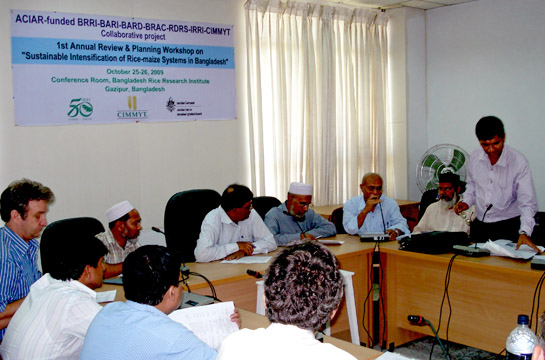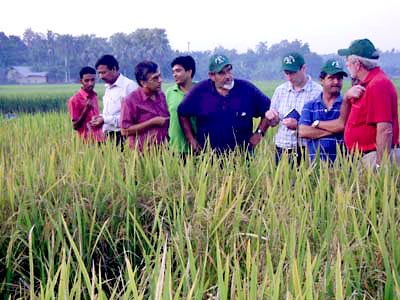 Partners of the “Sustainable intensification of rice-maize production systems in Bangladesh” met 25-29 October 2009 for the project’s first annual review—the program started in June 2008 and will run until 2013. Nearly 50 people attended the meeting held at the Bangladesh Rice Research Institute (BRRI) in Gazipur, Bangladesh. The Australian Center for International Agricultural Research (ACIAR) funds the project, which focuses on research and technology delivery for conservation agriculture (CA) and site-specific nutrient management (SSNM).
Partners of the “Sustainable intensification of rice-maize production systems in Bangladesh” met 25-29 October 2009 for the project’s first annual review—the program started in June 2008 and will run until 2013. Nearly 50 people attended the meeting held at the Bangladesh Rice Research Institute (BRRI) in Gazipur, Bangladesh. The Australian Center for International Agricultural Research (ACIAR) funds the project, which focuses on research and technology delivery for conservation agriculture (CA) and site-specific nutrient management (SSNM).
Several speakers opened the meeting, including Jagadish Timsina, senior CIMMYT-IRRI (International Rice Research Institute) cropping system agronomist. Timsina highlighted the teamwork between CIMMYT, IRRI, and multiple organizations in Bangladesh who together are working to develop, test, and disseminate sustainable CA-based management systems for highly intensive and productive rice-maize systems. CIMMYT and IRRI are jointly implementing the project. Representatives from the Bangladesh Agricultural Research Institute (BARI), BRRI, IRRI, and CIMMYT also delivered speeches, presented project results, and collaborated to form a revised work plan for the project’s next four years.
 The last three days of activities took place in the research stations of BARI, BRRI, and the Bangladesh Academy for Rural Development (BARD), as well as at on-farm sites in Rajshahi and Comilla. Scientists spoke with farmers about the benefits of CA technologies and received feedback from the farmers about the different technologies tested in their fields as well as overall project activities. First year CA activities for maize primarily focused on seeding on flat land with a power tiller operated seeder (PTOS) and seeding with a bed former/planter on raised beds under reduced tillage. For rice, emphasis has been on direct-seeded rice with the PTOS, direct-seeded rice using a bed former/planter, and transplanting seedlings on raised beds.
The last three days of activities took place in the research stations of BARI, BRRI, and the Bangladesh Academy for Rural Development (BARD), as well as at on-farm sites in Rajshahi and Comilla. Scientists spoke with farmers about the benefits of CA technologies and received feedback from the farmers about the different technologies tested in their fields as well as overall project activities. First year CA activities for maize primarily focused on seeding on flat land with a power tiller operated seeder (PTOS) and seeding with a bed former/planter on raised beds under reduced tillage. For rice, emphasis has been on direct-seeded rice with the PTOS, direct-seeded rice using a bed former/planter, and transplanting seedlings on raised beds.
In the Comilla project sites, locally managed by BARD, participants focused on SSNM trials. Three treatments for rice are currently being tested in these trials: farmers’ current fertilizer management practice, BRRI’s current recommendations, and the Nutrient Manager softwarebased recommendations. The goal of these comparison trials is to refine and evaluate Nutrient Manager and to optimize fertilizer recommendations to achieve the best benefits for farmers.
Representatives from the International Plant Nutritional Institute, Delhi and the Cereal Systems Initiative for South Asia (CSISA) also attended the meeting.